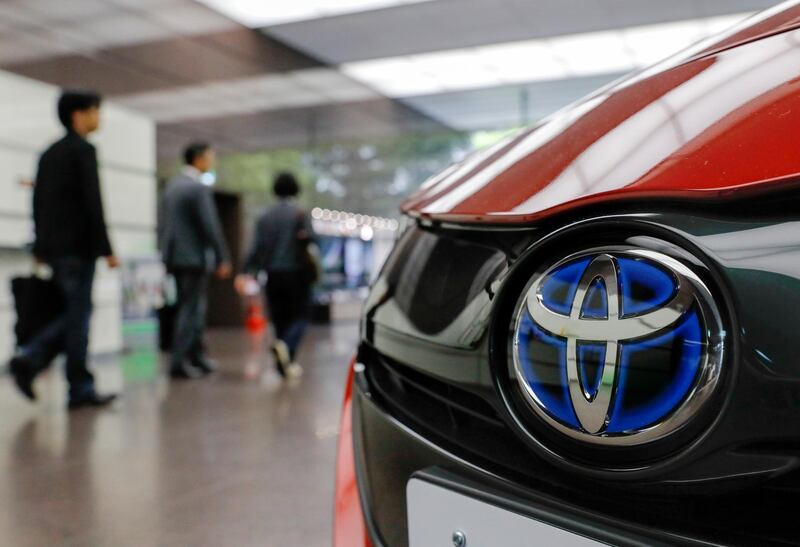Toyota Motor said higher US auto tariffs would ramp up the cost of vehicles produced locally along with those imported to the United States from Japan, which would have a "big impact" on its bottom line.
Like its global rivals, Toyota is bracing for the possibility of a rise in US auto import tariffs, which could cloud its outlook as it would raise the cost of selling vehicles in the world's second-biggest car market. Such uncertainty took the shine off strong quarterly results announced on Friday.
So far, Japan's biggest automakers and components suppliers said they have seen limited direct impact from US tariffs on steel and aluminium implemented in June, but they acknowledge they could take a significant hit if Washington delivers on proposals to hike tariffs on autos and auto parts to 25 per cent.
"If we see a rise, it would raise the cost of locally produced vehicles by around $1,800 (Dh6,610) each, and increase costs for (models imported from Japan) by $6,000," Toyota senior managing director Masayoshi Shirayanagi told reporters at a results briefing, referring to US-made Camry sedans, one of the automaker's most iconic models.
"This would be a big impact."
_______________
Read more:
Toyota to take $1bn stake in ride-hailer Grab
How car makers' wolves in sheep's clothing wring more cash from customers
_______________
The US is a major market for Japan's automakers. Toyota, Honda and Nissan locally produce around half or more of the cars they sell in the country. The remainder are imported from Japan, Canada, Mexico and elsewhere.
Based on the roughly 709,000 vehicles Toyota exported to the United States from Japan in 2017, the automaker could take an annual tariff-related hit of $4.25 billion on those vehicles alone.
Higher tariffs would deliver a major blow to all global automakers as most, including US ones, rely on imports to source the vehicles and parts contained in them which are sold in the United States.
Earlier this week, Denso, one of the world's biggest components suppliers, said US auto tariffs, if implemented, could wipe up to $720 million off annual profit. Ford Motor last week said tariffs in general could cost it up to $1.6b in 2018 in North America.
Toyota has been a vocal opponent of tariffs, arguing that 25 per cent would increase the cost of its US-made Camry sedan by $1,800 and $2,800 for its Tundra pick-up truck.
The automaker operates 10 production plants in the United States, and locally produces just under half of all the cars it sells in the country. Its share of localised production is lower than the 75 per cent of Honda and 60 per cent of Nissan.
Detroit automakers Ford and General Motors as well as Fiat Chrysler lowered their full-year profit forecasts last week amid worries escalating tariffs would hurt sales and profit margins.
Earlier on Friday, Toyota posted a 19 per cent jump in April-June operating profit to 683b yen ($6 billion), beating estimates and marking its strongest quarterly performance in two-and-a-half years on the back of higher sales and cost reductions in Asia.
Its global retail vehicle sales rose one per cent to 2.6m units in the quarter, boosted by a lift in Asia, where demand for the recently remodeled Camry helped to increase sales by 5.4 per cent in China, the world's biggest car market, during the first six months of 2018.
In North America, Toyota's biggest regional market, sales rose 3.2 per cent due to a rise in demand for its pick-up trucks, including the Tacoma and Tundra. Still, profit in the region fell 29 per cent as sales incentives continued to weigh.
The automaker maintained its full-year profit forecast at 2.3 trillion yen, a decline of 4.2 per cent, though it now expects the domestic currency to average 106 yen to the US. dollar, from an earlier forecast of 105 yen.
Overall, Toyota still expects a stronger yen to offset the benefits of cost-cutting and record-high global vehicle sales in the year through March.
Separately, Toyota and Isuzu Motors on Friday said they would dissolve their capital tie-up given limited progress made in their development partnership focusing on diesel engines. As a result, Toyota said it would sell off its 5.8 per cent stake in the Japanese truck maker.






